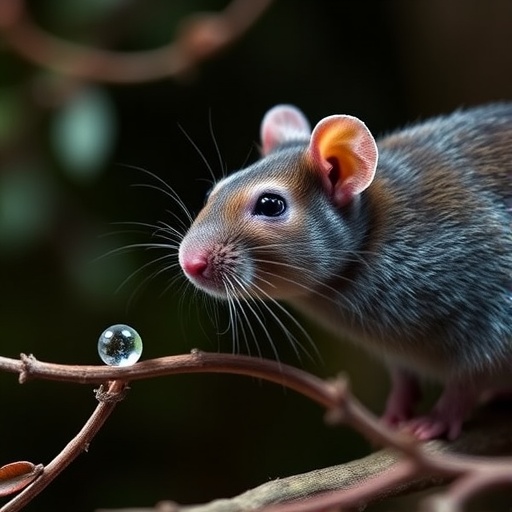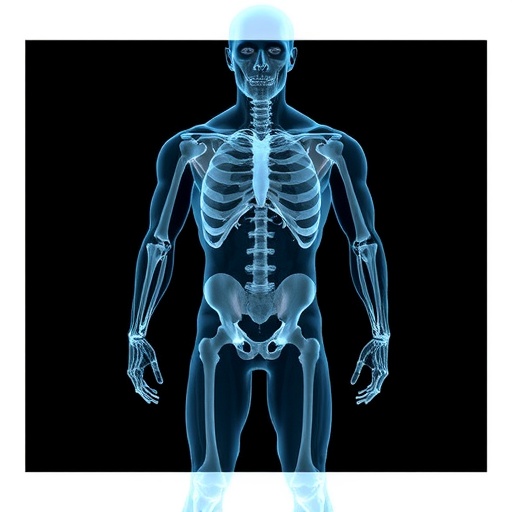
Recent research has unveiled a pivotal connection between ghrelin elevation and reproductive dysfunction in male rats subjected to feed restriction. Ghrelin, often referred to as the “hunger hormone,” plays a crucial role in regulating appetite and energy balance. These findings have significant implications for understanding how energy availability impacts reproductive health. The study, rigorously conducted by Ibrahim et al., utilized a controlled experimental framework to highlight the physiological and hormonal interactions responsible for reproductive impairments in male rats.
In the experiment, the researchers observed that male rats subjected to a restricted feeding regimen exhibited elevated levels of circulating ghrelin. This elevation indicated a compensatory mechanism in response to caloric deficit, aimed at stimulating appetite and promoting energy conservation. However, the consequences extended beyond energy regulation, as the rise in ghrelin correlated with significant reproductive dysfunction. The findings drew attention to the intricate hormonal interplay that could explain the observed reproductive issues, linking metabolic signals to reproductive health outcomes.
The concept of metabolic regulation influencing reproductive systems is not new, but this study provides an enlightening perspective by directly measuring ghrelin levels in relation to reproductive function. The researchers measured various reproductive parameters, including testosterone levels, sperm quality, and overall reproductive behavior, juxtaposing these metrics against ghrelin concentrations. The results substantiated the hypothesis that ghrelin elevation adversely affects reproductive functions, with implications for fertility.
One notable aspect of this study is the specificity of the feeding protocol used. By implementing a strict feed restriction strategy, the researchers established a robust model that accurately mimicked conditions of nutritional stress. This model enabled the observation of ghrelin dynamics in a controlled manner, clarifying its role as a potential mediator in the energy-reproductive axis. The hormonal landscape established in this research showcases how energy status intricately weaves into reproductive viability.
Moreover, the elevation of ghrelin was not an isolated change; multiple hormonal cascades were simultaneously influenced by the feeding regimen. For instance, while ghrelin surged, there was a concomitant alteration in leptin levels, another hormone closely associated with energy homeostasis and reproductive function. Leptin typically reflects energy stores and, like ghrelin, can influence the hypothalamic-pituitary-gonadal (HPG) axis, which governs reproductive health.
By examining these hormonal links, the researchers shed light on the role of ghrelin as a potential biomarker for reproductive dysfunction under caloric restriction. This association raises important questions regarding potential interventions; targeting ghrelin pathways may offer therapeutic avenues to mitigate reproductive issues stemming from nutritional deficiencies. This insight could be especially valuable in veterinary health and human medicine, where energy balance plays a critical role in reproductive success.
The methodological approach was rigorous, incorporating a mix of behavioral assessments, hormone measurements, and reproductive evaluations. The use of this multi-faceted strategy allowed for a comprehensive understanding of the relationship between ghrelin levels and reproductive health. Researchers utilized a variety of assays to ensure accurate hormone profiling, ultimately leading to robust conclusions regarding the impact of feed restriction on reproductive outcomes.
Interestingly, this exploration into the effects of ghrelin transcends simple animal model studies and resonates with broader issues of human health. The implications of reproductive dysfunction due to energy deprivation can parallel findings in humans, particularly in contexts of eating disorders or severe caloric deficits. As such, the relevance of this study may extend beyond its immediate findings, calling attention to the potential effects of lifestyle factors on human reproductive health.
Furthermore, the role of ghrelin in mediating energy-reproductive interactions opens the door for future research. Exploring the molecular pathways by which ghrelin affects the reproductive system could unveil novel therapeutic interventions targeting reproductive dysfunction. Potential studies can focus on whether modulation of ghrelin via pharmacological means could alleviate symptoms of reproductive impairments resulting from unfavorable nutritional states.
This research also emphasizes the necessity for a holistic understanding of how intertwined metabolic and reproductive health can be. As modern diets and lifestyles create varying states of nutritional balance, understanding the consequences of these states on hormonal profiles and reproductive health should become a priority in both research and clinical practice.
Therefore, this groundbreaking study not only clarifies the hormonal effects of ghrelin elevation linked to feed restrictions in male rats but also marks a significant contribution to the ongoing discourse on the intersection of nutrition and reproductive science. By drawing connections between these fields, Ibrahim et al. provide a comprehensive view of how hormonal signals regulate fundamental biological processes, reinforcing the importance of nutritional health in ensuring reproductive capabilities.
In summation, the work of Ibrahim and his colleagues is a compelling reminder of the intricate dynamics that govern our biology. While the immediate implications are rooted in animal research, the parallels to human health are profound. The pathway connecting ghrelin, nutrition, and reproduction invites a future rich with exploration and discovery, ultimately aiming to enhance our understanding and treatment of reproductive dysfunction across species.
Subject of Research: The relationship between ghrelin elevation and reproductive dysfunction in male rats subjected to feed restriction.
Article Title: Linking Ghrelin Elevation to Reproductive Dysfunction: Insights from Feed-Restricted Male Rats.
Article References:
Ibrahim, M.M., Seifelnasr, E., Ibrahim, M.A. et al. Linking Ghrelin Elevation to Reproductive Dysfunction: Insights from Feed-Restricted Male Rats.
Reprod. Sci. (2025). https://doi.org/10.1007/s43032-025-01943-2
Image Credits: AI Generated
DOI:
Keywords: ghrelin, reproductive dysfunction, feed restriction, male rats, hormonal interactions, energy balance, fertility, nutritional health, metabolic regulation.
Tags: controlled experimental framework in animal studiesenergy balance and reproductive issuesfeed restriction effects on reproductive healthghrelin elevation and reproductive dysfunctionhormonal interactions in male ratshunger hormone and male ratsIbrahim et al. research on ghrelin and reproductionimplications of caloric deficit on fertilitymetabolic regulation of reproductive systemsreproductive behavior and energy availabilitysperm quality and ghrelin levelstestosterone levels in feed-restricted rats



